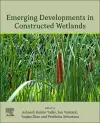
Emerging Developments in Constructed Wetlands
4 authors - Paperback
£134.00
Asheesh Kumar Yadav is a Principal Scientist and Associate Professor at CSIR-Institute of Minerals and Materials Technology, Bhubaneswar, India. He completed his doctoral study at the Indian Institute of Technology Delhi and postdoctoral studies at Princeton University, Princeton, NJ, USA. Currently, he is working as Marie Curie Fellow at Rey Juan Carlos, Madrid, Spain. He is the pioneer of constructed wetlands coupled microbial Electrochemical technology (CW-MET) for energy production, wastewater treatment, and other environmental applications. He received numerous awards like Marie Curie Fellowship; Indo-American Research Professorship (American Society of Microbiology); Four times winner of Erasmus Mundus Scholar Awards for teaching and research in universities in Germany, Poland, Sweden, Portugal; Winner of VLIR scholarships of Belgium; and Nuffic fellowship of the Netherlands. Besides this, He got an adjunct faculty position at the University of Tasmania, Australia. He is interested in developing low-cost energy generating and saving wastewater treatment systems with capabilities of resource recovery. Moreover, he is invested in developing circularity and sustainability in water and wastewater treatment systems. Dr Pratiksha Srivastava is currently a Postdoctoral fellow at Rey Juan Carlos University, Madrid, Spain. She did her Ph.D. studies at the University of Tasmania, Australia. She has a large number of publications in the domain METs. Her main focus is on high-rate wastewater treatment using METs. She is among the pioneer who developed electrode-dependent anaerobic ammonium oxidation in Constructed wetlands coupled with microbial electrochemical technology. The work has gained considerable attention among scientists. Based on her significant contribution to sustainability research, she received the prestigious Green Talent award from the German Federal Ministry in 2017. She is also a recipient of the Nuffic fellowship, the Netherlands, and many other competitive grants and national and international levels. Dr Md Tabish Noori is Research Professor (Brain Pool Fellow), Kyung Hee University, South Korea. He is graduated with a Doctoral degree from the Indian Institute of Technology Kharagpur, India. He is very much active in the research and development of cost-efficient electrode materials and polymeric separators for pilot scale microbial Microbial Electrochemical Technologies (METs), generating value-added chemicals and fuels from real waste streams, development of efficient electrode materials for METs and biosensors (particularly to diagnose Tuberculosis), highly porous electrode materials development for METs to generate bio-alcohols, fatty acids and methane from CO2. He received the prestigious SRISTI Gandhian Young Technological Innovation award from the President of India for his research contribution. He did multiple postdoctoral studies from Universidad De Alcala De Henares, Spain (Marie Sklodowska Curie fellow), Kyung Hee University, South Korea (Brain Korea 21 Plus postdoctoral fellow), and Indian Institute of Technology Kanpur, India. He applied for an Indian Patent and has published around 36 research articles in the peer review international journals (e.g., Biotechnology Advances, Bioresource Technology, ACS Applied Materials and Interfaces, RSC Sustainable Energy, Fuels, Electrochimica Acta, etc.) and 4 book chapters. He presented his works in several national and international scientific congresses held in India, Germany, Hong Kong, The United States, and South Korea. Dr Yifeng Zhang is currently working as an Associate Professor at the Department of Environmental Engineering, Technical University of Denmark (DTU). He is also serving as Associate Editor at several prestigious journals, including Water Research, Science of the Total Environment, and Frontiers in Microbiology. He obtained his Ph.D. degree from DTU in 2012. His major research interests are microbial electrochemical technology and biotechnology-based process development to support the 2nd, 6th, 7th, 12th, and 13th UN Sustainable Development Goals through sustainable water treatment, resource recovery, CO2 capture and utilization, biosynthesis, and environmental bioremediation & monitoring. His research has been highly innovative and contributed considerably to improving the fundamental understanding of microbial electrochemistry and developing cutting-edge, efficient, and economic-affordable technical solutions in the Water-Food-Energy-Climate nexus for sustainable development and green transition. This way, the wastewaters and greenhouse gases (e.g., CO2) are recovered and upcycled in the form of valuable bioproducts, which otherwise are treated as pollutants undergoing energy and carbon-intensive treatment processes. His research has been well documented in 99 SCI publications (19 as first author and 65 as the corresponding author), 2 patents, 3 book chapters, and =30 conference contributions. Most of the SCI publications are in top journals in the field, such as Energy & Environmental Science, Trends in Biotechnology, Environmental Science & Technology, and Water Research. According to Google Scholar, his works have been cited over 4100 times and with an H index of 36. Since 2012, He has been successfully attracting over 4 M Euro international and national research fundings. Especially in 2018, he received Carlsberg Foundation Distinguished Fellowships, which are given to talented young scientists to establish their research group. He was shortlisted and interviewed for the Young Investigator Program funded by Villum Foundation in the same year. In 2020, he was selected as top 50 among global competitions for The Elsevier Foundation-ISC3 Green & Sustainable Chemistry Challenge Award. He recently received Honorable Mentions from the James J. Morgan Award 2022 for Great Achievements in Environmental Science & Technology